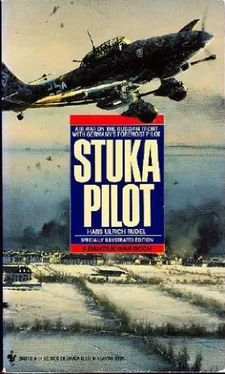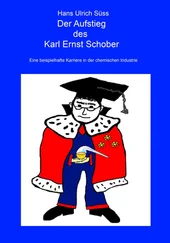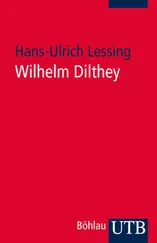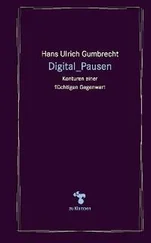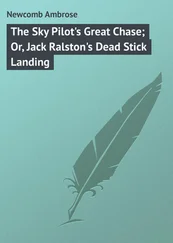The adjutant comes in and says to me:
“Wing Commander von Below has just rung up. He would like you to go over for a cup of coffee.”
“But can I not report direct to the Reichsmarschall?”
“The Reichsmarschall is not here yet, and there is no reason why you should not pay this short visit to Wing Commander von Below.”
I consider whether I ought to change, but decide against it because I would like to keep my last clean shirt for my interview with the Reichsmarschall.
A fairly long drive through the forest brings us into a town of huts and chalets, the Führer’s Western H.Q. Over coffee I tell Wing Commander von Below about the latest happenings on the Russian front; after twenty minutes he leaves me, comes back at once and briefly asks me to follow him. Quite unsuspectingly I follow him through several rooms, then he opens a door, stands aside for me to pass and I am face to face with the Führer. All I can think of is that I have not put on a clean shirt; otherwise my mind is a blank. I recognize the other persons standing round him: the Reichsmarschall, beaming—very unusual of late—Admiral Dönitz, Field Marshal Keitel, the Chief of the General Staff, Lieutenant General Jodl and a number of other military notabilities including Generals from the Eastern Front. They are all grouped round an enormous table spread with a map showing the present situation in the field. They look at me and this scrutiny makes me nervous. The Führer has noticed my embarrassment and regards me for a while in silence. Then he offers me his hand and praises my last operation. He says that in recognition of it he is awarding me the highest decoration for bravery, the Gold Oak Leaves with Swords and Diamonds to the Knight’s Cross of the Iron Cross, and is promoting me to the rank of Group Captain. I have been listening to his words in a semi-daze, but when he says with marked emphasis: “Now you have done enough flying. Your life must be preserved for the sake of our German youth and your experience,” I am on the alert in a twinkling. This means I am to be grounded. Goodbye to my comrades!
“My Führer, I cannot accept the decoration and promotion if I am not allowed to go on flying with my wing.”
My right hand is still clasped in his, he is still looking me in the eyes. With his left hand he gives me a black, velvet lined case containing the new decoration. The many lights in the room make the diamonds sparkle in a blaze of prismatic colors. He looks at me very gravely, then his expression changes, and he says: “All right, you may go on flying,” and smiles.
At this a warm wave of joy wells up in my heart and I am happy. Afterwards von Below tells me that he and the generals nearly had a stroke when I made my proviso; he assures me that the sheet lightning in the Führer’s face does not always resolve into a smile. Everyone offers his congratulations, the Commander in Chief of the Luftwaffe with especial cordiality; he gives me a hefty pinch in the arm from sheer delight. Admiral Dönitz’s congratulations are rather qualified, for he adds a trifle snappishly:
“I consider your persuading the Führer to allow you to go on flying unsoldierly. I have also had good U-boat captains, but sooner or later they have had to give up.”
It is a good thing he is not my C-in-C.
The Führer takes me over to the map table and tells me that the conference they have just had concerned the situation at Budapest; I have come from that sector, have I not? He recapitulates the reasons given him for the not exactly satisfactory operation now in progress in the Budapest area, which has so far failed to affect a link-up with the encircled city. I gather that weather, transport and other difficulties have been offered as an excuse, but no mention has been made of the blunders which we see every day on our sorties: the splitting up of the armored divisions and the choice of unsuitable terrain for both the tank and infantry assaults. I express my opinion, based on long experience of the Eastern Front and the fact that during this engagement I have flown as much as eight hours daily over this sector, mostly at low altitudes. They all listen to me in silence. After a short pause the Führer remarks, with a glance at the circle of his advisers:
“You see, this is how I have been misled—who knows for how long?”
He reproaches nobody although he knows the true circumstances, but it is evident that he resents the deception practiced on him. With reference to the map he shows his willingness to regroup our forces for a fresh attempt to relieve Budapest. He asks me where I think would be the most favorable terrain for the armored units to attack. I give my opinion. Later this operation is successful, and the assault group reaches the outposts of the defenders of Budapest who are able to break out.
When the conference is ended he takes me into his private study in an adjoining room, furnished in good taste and with utilitarian simplicity. I wished my comrades could be there and live through these hours with me, for it is because of their achievement that I am here. The Führer gives me a drink, and we talk of many things. He asks after my wife, our boy, my parents and my sisters. Having made the most detailed enquiries about my personal affairs, he begins to speak of his ideas of rearmament. Not unnaturally he starts with the Luftwaffe, dwelling particularly on the proposed modification of the aircraft we are using. He asks me if I still think it practicable to continue flying with the slow Ju. 87 now that the enemy’s fighters are as much as 250 m.p.h. faster than they are. Referring to some blue prints and calculations he points out to me that a retractable undercarriage might increase the speed of the Ju. 87 by 37 m.p.h. at the very most; on the other hand, its diving performance would be disadvantageously affected. He solicits my opinion on every point. He discusses the minutest details in the field of ballistics, physics and chemistry with an ease which impresses me who am a critical observer in this department. He also tells me of his wish to have experiments carried out to test the feasibility of installing four 3 cm. cannon in the wings instead of the present two 3.7 cannon. He thinks that the aerodynamic qualities of our antitank aircraft would be very greatly improved by this change; the ammunition would have the same Wolframkern with the result that the total effectiveness of the aircraft as a weapon would certainly be enhanced.
After explaining to me far-reaching improvements in other departments, such as artillery, infantry weapons and U-boats all with the same astonishing knowledge—he tells me that he has personally drafted the wording of the citation for my latest decoration.
We have probably been chatting for an hour and a half when an orderly reports that “the film is ready for showing.” Every new weekly newsreel is immediately shown to him and given his sanction for release. It so happens—we have gone down only one flight of stairs and are seated in the film theatre—that the first pictures actually show a scene taken at my dispersal at Stuhlweissenburg, followed by our Stukas taking off and ending with a picture of tanks being shot up by me in the area west of Budapest. After the film has been shown I take my leave of the Supreme Commander. Wing Commander von Below hands me the citation for the Knight’s Cross, the Oak Leaves, the Swords and the Diamonds, which have lain in the Reichs Chancery. Each of them weighs several pounds, especially the last two which are framed in gold and, apart from their great sentimental value, must be worth quite a lot. I drive to Goering’s H.Q. The Reichsmarschall expresses his pleasure which is all the greater because recent events have made his position very difficult. The enemy’s air superiority has aggravated almost all our troubles and even made things impossible, but who could prevent it? He is overjoyed and proud that at this moment one of his men should have been instrumental in making the Führer create a new German decoration for bravery. Drawing me a little aside he says to me roguishly:
Читать дальше
